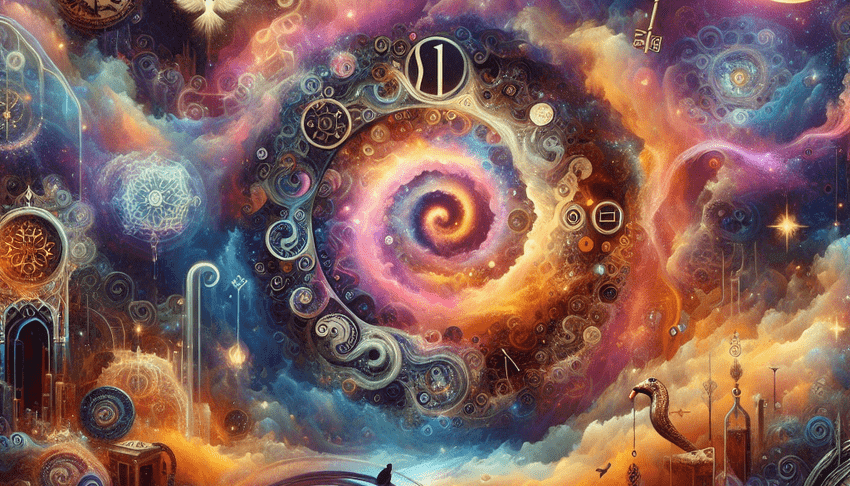Table of Contents
The Psychological Underpinnings of Loss Dreams

Unpacking the Emotional Significance
Dreams have a notorious reputation for being the messengers of our subconscious, a place where our deepest fears, aspirations, and emotions intermingle. Interpreting lost objects in dreams can provide an insightful glimpse into the labyrinth of our inner psyche, revealing layers of emotional significance that often go unnoticed during our waking hours.
Understanding the Emotional Tapestry Behind Lost Objects in Dreams
When an object goes missing in your dream, it’s easy to write it off as a fluke of nocturnal brain activity. However, these dreams can be emblematic of deeper emotional states. Losing something important often correlates with an underlying feeling of anxiety or a fear of losing control in some aspect of your real life. These dreamed losses can render us feeling helpless, exposing our insecurities or a dread of inadequacy as we face life’s challenges.
Lost objects in dreams can also replicate the sense of confusion or searching that we experience in our daily existence. Whether it’s groping for direction in your career, seeking clarity in a relationship, or grappling with a decision, the act of searching for something missing mimics the quest for understanding or resolution we yearn for.
- For example, misplacing a wallet or purse might symbolize financial worries or a fear of losing your identity, as these items are often associated with both.
- Losing a cherished piece of jewelry in a dream may reflect anxiety over a personal relationship, given that such items often represent love and commitment.
- The hunt for a lost path in a dream landscape might mirror the dreamer’s search for direction or purpose in life.
The Symbolic Function of Objects in Dreams
Object symbolism in dreams extends beyond the mere frustration of loss. Different objects carry distinct emotional and psychological weights, deriving their meanings from cultural beliefs and personal associations. Interpreting lost objects in dreams requires us to ask what the object represents for us personally. It may not be the literal object we are mourning in our dream state but rather what that object signifies – autonomy, security, affection, or something else entirely.
Interpretation can also shift depending on the context of the loss. Was the object stolen, carelessly misplaced, or simply vanished? Each scenario invites unique emotional undertones – violation, negligence, or mystical intervention.
Object symbolism in dreams holds a powerful sway over our waking emotions, often acting as an outlet for the stress or desires that we suppress. By understanding and interpreting these symbols, we can decode messages from our subconscious and work towards resolving internal conflicts.
By offering a rich tapestry of emotional introspection, dream interpretation continues to be an invaluable tool in the realm of mental and emotional development. As we navigate the shadowy corridors of the mind, recognizing lost objects in dreams and dissecting their symbolism can be the key to unlocking profound personal growth and emotional healing.
Control and Insecurity
Dreams have always been a fascinating frontier for scientists and psychologists alike, with lost objects in dreams being a particularly intriguing topic. When we dream of losing objects, the feelings of panic and helplessness often experienced can reflect deeper issues of control and insecurity in our waking lives. To understand why interpreting lost objects in dreams can have substantial merit, we must delve into what objects symbolize and how they connect to our sense of control.
Whenever lost objects in dreams enter our nocturnal narratives, it might be tempting to write it off as a random event. However, object symbolism within dreams serves as a profound communicator of our internal states. Objects often carry a weight of significance, generally linked to personal or professional aspects of one’s life. For instance, losing a wallet might not only stir anxiety over the loss of financial control but also symbolize a deeper fear of losing one’s identity or personal security, as wallets often house our most essential identifiers.
Strong emotions can manifest in our dreams in symbolic forms. The feeling of losing control is commonly replicated through scenarios where important objects slip from our grasp. These scenarios mirror real-life situations where we might feel overwhelmed or uncertain. Dreams of misplaced possessions often emerge during periods of transition—such as moving to a new job or experiencing shifts in personal relationships—situations that inherently evoke feelings of insecurity about the unknown or unmastered.
- Interpreting lost objects in dreams requires us to look beyond the surface and into our subconscious concerns.
- Dream interpretation connects the loss of control displayed in dreams to daily instances where we might feel dominated by circumstances.
- By critically analyzing these dreams, individuals can glean insights into their emotional coping mechanisms and potential areas in their lives that may need reassessment or support.
The balance between exerting control and allowing life to unfold is difficult to maintain, and dreams often highlight this tension. Learning to interpret these lost objects in dreams with the assistance of object symbolism provides a unique conduit to our psychological state. As we become more adept at recognizing and acknowledging the underlying themes of control and insecurity in our dreams, we can begin to address these concerns consciously.
Engaging in dream interpretation does not require one to relinquish a scientific lens. On the contrary, historical and contemporary research has reinforced the significance of dreams in understanding our emotional and mental landscapes. Linking the symbolism of lost objects to our waking life experiences enables a holistic perspective, one that respects the importance of emotional intelligence and promotes psychological well-being.
In embracing the practice of dream interpretation—specifically focusing on lost objects in dreams and object symbolism—individuals become equipped to traverse their inner landscapes with greater clarity and foresight, leading to enhanced emotional intelligence and a more balanced mental state. Therefore, the next time an important object goes missing in your dream, take a moment to reflect on what aspect of control in your life might be signaling for your attention.
Cultural and Symbolic Interpretations of Loss Dreams

Cultural and Symbolic Interpretations of Loss Dreams
Understanding the symbols that permeate our dreaming world can offer profound insights into our waking lives, particularly when those symbols represent something lost. Dreaming of lost objects, a phenomenon that many people experience at different stages of their lives, is often rich with meaning and ripe for interpretation.
Losing objects in dreams can symbolize various aspects of our lives. These symbols transcend cultural boundaries, tapping into a collective subconscious that reflects common human experiences, such as fear of loss, a desire for retrieval, and the journey towards personal development.
Universal Fear and the Search for the Lost
- Lost objects in dreams often highlight a universal fear of losing something valuable – be it a personal relationship, an aspect of identity, or a treasured possession.
- Interpreting lost objects in dreams requires understanding the emotional context of the loss within the dream. This context often mirrors real-life anxieties or insecurities.
- The search for lost objects in the dream can represent the dreamer’s quest to regain control, resolve unresolved issues, or retrieve aspects of themselves they feel they have lost.
Cultural Variations in Object Symbolism
Each culture has its own set of symbols and meanings associated with loss and recovery. For instance, in some Eastern traditions, losing an object might be seen as an indication of detachment from material possessions, signaling personal growth or spiritual advancement. In contrast, Western symbolism might frame the loss as a sign of inner turmoil or a call to action to address unresolved issues.
The nature of the object lost, as well as the dreamer’s emotional response to the loss, are pivotal in interpreting lost objects in dreams. Here are some examples:
- A lost key might symbolize missed opportunities or locked potential, urging the dreamer to find new ways to unlock their capabilities.
- Lost money can hint at insecurity or anxiety about one’s financial stability or self-worth.
- Losing a precious family heirloom may indicate a fear of losing touch with one’s heritage or family ties.
Retrieval and Recovery: A Path to Wholeness
The act of finding or retrieving the lost object in a dream can be a significant moment, symbolizing the overcoming of obstacles or the dreamer’s readiness to address issues in their waking life. This theme of recovery is a beacon of hope that often serves as a guidepost pointing towards healing and growth.
Connection to Our Collective Subconscious
In grappling with lost objects in dreams, we engage with a symbolic language that has been a part of the human experience for millennia. These symbols, derived from our collective subconscious, offer a universal dialogue through which we can understand our deepest emotions and fears.
By interpreting these symbols and applying their meanings to our waking lives, we can uncover hidden truths about ourselves, fostering personal development and greater emotional intelligence. The key to unlocking the wisdom of dream interpretation lies in the careful and thoughtful analysis of these universal symbols of loss, guiding us toward self-discovery and fulfillment.
Navigating Real-Life Implications Through Dream Analysis
Interpreting lost objects in dreams is akin to decoding a unique language of the subconscious. The scene where we frantically search for missing keys or a cherished heirloom in a dream can evoke discomfort, but it also offers a rich tapestry for analysis. Object symbolism runs deep, as every item in a dream can be a reflection of our inner state, emotions, fears, and desires. While the practice of dreaming remains a mystery on many fronts, analyzing these nocturnal narratives can be a profound tool for self-awareness and Emotional Intelligence growth.
Navigating the Sea of the Subconscious
To illuminate the shores of understanding, we begin by diving into the symbolism of Lost objects in dreams. Traditionally, items that go missing in our dreams often point to an aspect of our lives that feels out of control or lost. It reflects a search for something missing, perhaps an attribute or a relationship that we yearn to recover or a sense of personal direction we are seeking to reclaim.
- Understanding Dream Symbolism: Object symbolism in our dreams is multifaceted. For instance, losing a watch may symbolize a fear of losing time or a sense of urgency, whereas misplacing a book might represent forgotten knowledge or untapped potential.
- Interpreting Personal Contexts: Personal connections to objects determine their value in our dreams. A ring given by a loved one carries weight that is largely emotional, hinting at lost connections or transitions in personal relationships.
- Considering Recurring Themes: Interpreting lost objects in dreams that occur repeatedly becomes crucial. They could be urging us to pay attention to unresolved issues or neglected parts of our lives calling for attention.
Integrating Dream Insights into Waking Life
Once there’s a foundational understanding of the symbols, interpreting lost objects in dreams provides a rich source of insight. Integrating these insights into daily life can inform and strengthen Emotional Intelligence. Recognizing emotions that surface in the dream and linking them to waking life enables us to strategically approach our emotional responses and enhance self-awareness.
- Addressing Emotional Responses: If a lost object in a dream stimulates anxiety, this mirrors our waking life emotions, prompting the need to attend to anxieties and find their root causes.
- Using Dreams as a Roadmap: Dreams about lost objects can signal areas of our life that require our attention. They can be a call to action, to refocus efforts on things we’ve neglected or to re-evaluate priorities.
- Enhancing Self-Knowledge: Reflecting on these dreams can lead to profound personal insights, fostering growth in Emotional Intelligence by making conscious the unconscious aspects of our personality and decision-making processes.
Applying Dream Analysis in Practice
Interpreting lost objects in dreams goes beyond symbolic interpretation; it calls for paying attention to emotional nuances and context. Every dream is a piece to a larger puzzle of the psyche. A considered approach to dream interpretation and symbolism, along with practical examples and academic research backup, can facilitate a greater connection between dreams and real-life dynamics.
In summary, dreams are not just flights of fantasy but critical messages from our inner selves. By carefully interpreting object symbolism, especially when confronting lost objects in our dreams, we unlock a path to greater self-awareness and development in our waking lives. Applying the insights gleaned from analyses can pave the way to understanding complex emotional landscapes and nurturing our Emotional Intelligence.
Summary
Dreams are often a window into the inner workings of our subconscious, and by exploring the theme of lost objects in dreams, we uncover insights into our emotional and psychological landscapes. The phenomenon of losing items in dreams might seem trivial, but these scenarios are rich in symbolism and can reveal much about our waking life insecurities and fears.
Lost objects in dreams can be strikingly evocative of our anxieties and emotional challenges. For instance, if you dream of misplacing your wallet or keys, it might symbolize financial insecurities or a worry about missing opportunities. Let’s delve deeper into understanding what it means when we experience the loss of objects in our dream world and how this understanding can facilitate personal growth.
Emotional Significance of Lost Objects in Dreams
Dreams about losing important items often mirror a sense of anxiety or a fear of losing control that we experience during our waking hours. This can leave us feeling helpless and expose our insecurities. The emotional tapestry behind such dreams highlights our yearning for direction and clarity in various aspects of our lives.
- A lost purse or wallet might signal concerns about identity and financial security.
- Dreams of misplacing jewelry could reflect worries about the status of a relationship.
- The quest for a lost path might symbolize the search for life’s purpose.
Interpreting the Symbolic Function of Objects in Dreams
The items we lose in dreams carry distinct personal and cultural emotional weights. The loss itself is important, but the meaning often derives from what the item represents in our lives, such as autonomy, security, or affection. The context in which the object is lost also plays a crucial role, as different scenarios can indicate violation, negligence, or a sense of mystical intervention.
- Losing books might symbolize forgotten knowledge or unused potential.
- A lost watch could reflect worries about time and life’s fleeting nature.
Unlocking Personal Growth
Understanding lost objects in dreams is not just an intellectual exercise but a practical tool that can lead to personal growth and enhance our Emotional Intelligence. Recognizing the emotions stirred by these dreams and linking them to our current life can shed light on areas needing attention or resolution.
- Addressing emotional responses to lost objects in dreams can help identify and manage anxieties in our waking life.
- Using these dream scenarios as a roadmap can signal neglected aspects of life that need focus or a re-assessment of priorities.
Symbolism as a Universal Language
Lost objects in dreams tap into a collective subconscious, revealing a symbolic language that spans cultures and experiences. By interpreting these symbols, we can gain insights into our fears and desires, aiding our journey towards self-discovery and emotional wholeness.
In summary, the occurrence of lost objects in dreams allows us to explore our inner self, unravel our insecurities, and offers a unique perspective to foster our Emotional Intelligence. Careful analysis of these dream symbols serves as a bridge connecting our subconscious narratives and conscious experiences, providing a profound gateway to self-awareness and improvement.
FAQ – Dreams About Lost Objects: Uncovering Meanings
What can dreaming about losing objects indicate in relation to one’s emotions or fears?
Dreaming about losing objects can often reflect underlying feelings of anxiety, insecurity, or a sense of losing control in one’s waking life. It may indicate fear of loss or change, such as concerns over losing a job, relationship, or personal stability. This type of dream could serve as a subconscious nudge to address these emotional quandaries directly or to seek a semblance of order in areas where one perceives chaos.
What do dreams about losing objects symbolize?
Dreams about losing objects often symbolize feelings of loss, anxiety, or a lack of control in a person’s waking life. They may reflect concerns over losing something important, such as a job, relationship, or personal stability. Understanding these dreams can provide insights into our deepest fears and help us address the emotional upheavals or challenges we might be facing.
What could losing objects in a dream symbolize?
Losing objects in a dream could symbolize feelings of losing control or anxiety about misplacing one’s priorities or values in waking life. It may reflect an underlying stress about personal losses or the fear of not being able to retrieve or hold onto something important, such as a relationship, job, or personal goal. These dreams often invite individuals to consider what they truly value and to examine any current circumstances that may be contributing to such feelings of loss or disarray.




